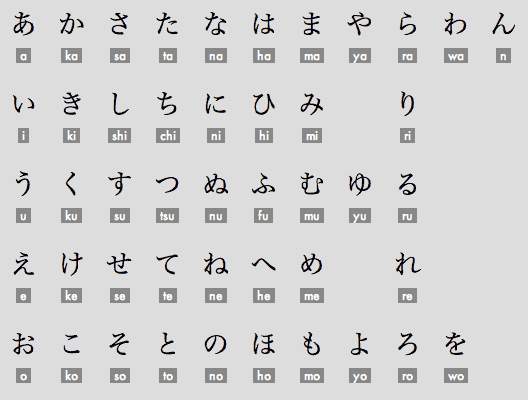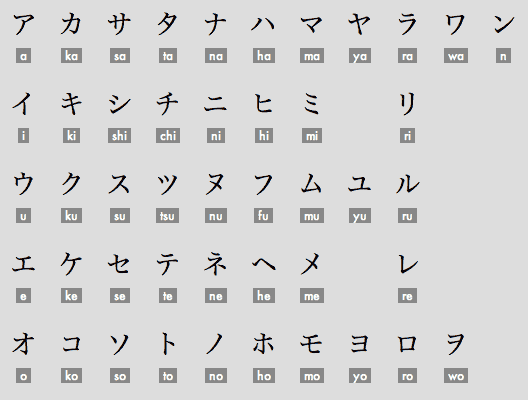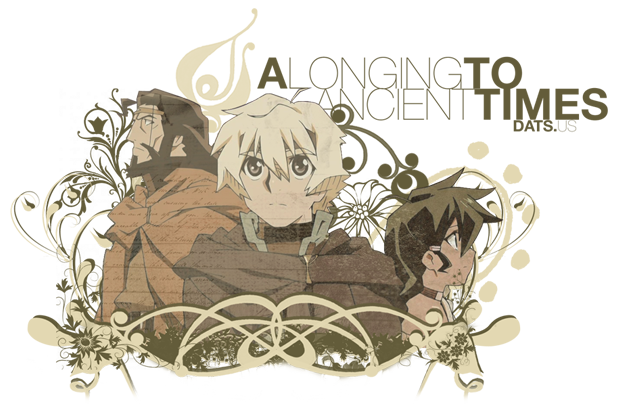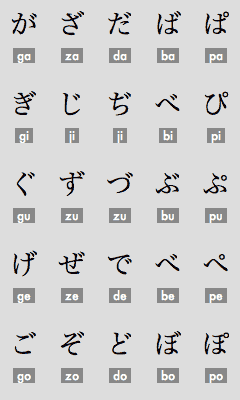miforever
Rokkuman-sama~ ^^;;
[Japanese] Japanese 日本語!
Well, I thought that since no one has posted here, I'd start a thread on the native language of Japan!
Now, when it comes to Japanese, I'll be straight with you guys: I suck. BUT this doesn't mean I don't know some things. I'd be great for beginners as well as those who are fluent to take part in this thread. I'm a beginner too, so I'll only be mentioning the basics.
There are 3 main ways of writing in Japanese:
Hiragana: Simple characters, esentially the Japanese alphabet, consisting of 46 base characters.
Katakana: Also contains 46 characters, with the same sounds as hiragana. However these characters are used to mimic words from foreign languages, like English, Spanish, French, etc.
Kanji: Complicated characters. There are literally hundreds of them. Each character has a base meaning and can be combined with other kanji to create new meanings. They're originally based off of pictures of real things, becoming simplified over hundreds of years.
Here's are the two alphabets. I don't remember where I got these charts, but they're simple enough to find in a google search.
Hiragana:

Katakana:

The romaji is written under character, so you can learn to pronounce them. It's a good idea to try and memorise both of these alphabets before you continue.
Now, some basic Vocabulary!
Greetings!!
おはようございます! OR おはよう!
Ohayou gozaimasu! OR Ohayou! -> Good Morning!
(formal) (casual)
こんにちは!
Konnichi wa! -> Good Afternoon! *
こんばんは!
Konban wa! -> Good Evening! *
* It is important to note here that the character "は" is being pronounced as "wa" instead of "ha". This is because in this case, "は" is a sentence particle. Particles are used in many different contexts. In this case, "は" is a topic marker. (subject/topic は ...).
Farewells!!
さよなら OR さようなら
sayonara OR sayounara -> Goodbye
(both correct) (formal)
じゃ
ja -> See you/Bye
(casual)
じゃまた
jamata -> See you/Bye
(formal)
しつれいします
shitsureishimasu -> Goodbye (used when excusing oneself from company)
(Formal)
おやすみ OR おやすみなさい
Oyasumi OR Oyasuminasai -> Good night
(casual) (formal)
Well, that's all for now! Everyone, feel free to contribute, or point out mistakes!!
Well, I thought that since no one has posted here, I'd start a thread on the native language of Japan!
Now, when it comes to Japanese, I'll be straight with you guys: I suck. BUT this doesn't mean I don't know some things. I'd be great for beginners as well as those who are fluent to take part in this thread. I'm a beginner too, so I'll only be mentioning the basics.
There are 3 main ways of writing in Japanese:
Hiragana: Simple characters, esentially the Japanese alphabet, consisting of 46 base characters.
Katakana: Also contains 46 characters, with the same sounds as hiragana. However these characters are used to mimic words from foreign languages, like English, Spanish, French, etc.
Kanji: Complicated characters. There are literally hundreds of them. Each character has a base meaning and can be combined with other kanji to create new meanings. They're originally based off of pictures of real things, becoming simplified over hundreds of years.
Here's are the two alphabets. I don't remember where I got these charts, but they're simple enough to find in a google search.
Hiragana:

Katakana:

The romaji is written under character, so you can learn to pronounce them. It's a good idea to try and memorise both of these alphabets before you continue.
Now, some basic Vocabulary!
Greetings!!
おはようございます! OR おはよう!
Ohayou gozaimasu! OR Ohayou! -> Good Morning!
(formal) (casual)
こんにちは!
Konnichi wa! -> Good Afternoon! *
こんばんは!
Konban wa! -> Good Evening! *
* It is important to note here that the character "は" is being pronounced as "wa" instead of "ha". This is because in this case, "は" is a sentence particle. Particles are used in many different contexts. In this case, "は" is a topic marker. (subject/topic は ...).
Farewells!!
さよなら OR さようなら
sayonara OR sayounara -> Goodbye
(both correct) (formal)
じゃ
ja -> See you/Bye
(casual)
じゃまた
jamata -> See you/Bye
(formal)
しつれいします
shitsureishimasu -> Goodbye (used when excusing oneself from company)
(Formal)
おやすみ OR おやすみなさい
Oyasumi OR Oyasuminasai -> Good night
(casual) (formal)
Well, that's all for now! Everyone, feel free to contribute, or point out mistakes!!




 also I think it'd be better if you listen to a native speaker (no matter what language it is). Failing that, someone who's highly fluent would be good, or even simply watching your fav anime in Japanese, with your ears pricked for the different sounds made can help!
also I think it'd be better if you listen to a native speaker (no matter what language it is). Failing that, someone who's highly fluent would be good, or even simply watching your fav anime in Japanese, with your ears pricked for the different sounds made can help! 
